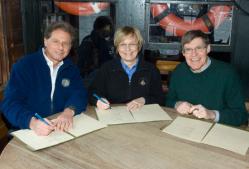
Left to right: MBL Director Gary Borisy, WHOI President and Director Susan Avery, and WHRC Acting Director Richard Houghton shake hands after signing the Memorandum of Agreement creating the Woods Hole Consortium. (Tom Kleindinst, Woods Hole Oceanographic Institution)
Three leading research centers based in Woods Hole, Massachusetts, announce the creation of the Woods Hole Consortium, a new alliance that will bring their combined scientific power to bear on some of the major issues facing society today and spawn scientific growth and job opportunity on the South Coast of Massachusetts.
The consortium comprises the Woods Hole Marine Biological Laboratory (MBL), Woods Hole Oceanographic Institution (WHOI), and Woods Hole Research Center (WHRC), and focuses on the interlocking issues of climate change and ecosystems health and human well-being.
Massachusetts officials, including Senate President Therese Murray, Senator Robert O’Leary (D-Barnstable), and Representative Timothy R. Madden (D-Nantucket) and MassDevelopment President and CEO Robert L. Culver hailed the consortium for its potential benefits to the state.
“Individually, each of these organizations is world renowned for their cutting-edge work,” said Senate President Murray. “Combining their efforts will make the Woods Hole scientific community a powerhouse for research and providing solutions to the environmental issues facing the world. This consortium will add even more prestige to an already stellar reputation of cutting-edge research.”
“This is a wonderful idea,” said Senator O’Leary. “Collaboration is always important but in difficult financial times, it is crucial. Awareness of the importance of the marine environment and marine research is growing and to see these three very reputable institutions come together is a great show of support for marine research and the environment.”
"I am pleased to see that these world-leading institutions are coming together. The cooperation and collaboration of these institutions enhances the scientific and academic resources of the Woods Hole scientific community in battling tough and timely issues, such as climate change. I look forward to working with the consortium in the future and seeing the new discoveries made as this evolves. The work being done in Woods Hole is something beneficial to the entire planet. I think it’s wonderful that these institutions are coming together for the betterment of all our lives," said Representative Madden.
“There is strength in numbers, so it’s exciting to see these institutions join together to address climate change, energy and other environmental issues,” added Mr. Culver. “On the economic development side, they create more than ideas. They create good jobs and serve as the backbone of the regional economy. I look forward to working with the consortium to support the members as they develop new programs and initiatives.”
A major goal of the consortium is to strengthen Woods Hole’s reputation as an international hub of scientific excellence by accelerating research outcomes and attracting new funding sources. The alliance is also expected to create new opportunities for job growth in the region through scientific advancements enabling spin-off companies.
Although each participating institution will maintain its individual identity, the consortium will facilitate research and educational collaborations that capitalize on the complementary strengths of the institutions in areas of mutual concern, including:
• Climate change and its impacts
• Sustainable energy
• Earth’s processes and cycles
• Land-ocean-atmosphere interactions
• Oceans and human health
• Living marine resources and biodiversity
• Human impacts on our planet’s environment
According to MBL Director and CEO Gary Borisy, the Woods Hole Consortium makes perfect sense. “The missions of the MBL, WHOI, and WHRC are complementary and synergistic,” he said. “This unique and powerful scientific partnership will be more effective than the sum of the individual efforts of these institutions. By working together, we can serve society with our combined knowledge.”
WHRC Acting Director R. A. “Skee” Houghton agreed. “Our institutions have always been collegial and collaborative, especially in those areas where our research interests are complementary or overlap,” he said. “This formal agreement acknowledges that cooperative foundation. By establishing the consortium, we can more clearly focus our shared resources and objectives on addressing the key scientific issues of our time.”
"We’ve got something very special here in Woods Hole — a very vibrant scientific community bringing its unique intellectual resources to bear on some of society’s greatest problems,” added WHOI President and Director, Susan Avery. “This agreement acknowledges our commitment to maximize the potential of these independent organizations, by collaborating, whenever possible, to make the world a better place.”

